
Pinochle, also called pinocle or penuchle, is a trick-taking, Ace-Ten card game typically for two to four players and played with a 48-card deck. It is derived from the card game bezique; players score points by trick-taking and also by forming combinations of cards into melds. It is thus considered part of a "trick-and-meld" category which also includes the game belote. Each hand is played in three phases: bidding, melds, and tricks. The standard game today is called "partnership auction pinochle".

Sheepshead is an American trick-taking card game derived from Bavaria's national card game, Schafkopf. Sheepshead is most commonly played by five players, but variants exist to allow for two to eight players. There are also many other variants to the game rules, and many slang terms used with the game.

A trick-taking game is a card or tile-based game in which play of a hand centers on a series of finite rounds or units of play, called tricks, which are each evaluated to determine a winner or taker of that trick. The object of such games then may be closely tied to the number of tricks taken, as in plain-trick games such as contract bridge, whist, and spades, or to the value of the cards contained in taken tricks, as in point-trick games such as pinochle, the tarot family, briscola, and most evasion games like hearts. Trick-and-draw games are trick-taking games in which the players can fill up their hands after each trick. In most variants, players are free to play any card into a trick in the first phase of the game, but must follow suit as soon as the stock is depleted. Trick-avoidance games like reversis or polignac are those in which the aim is to avoid taking some or all tricks.
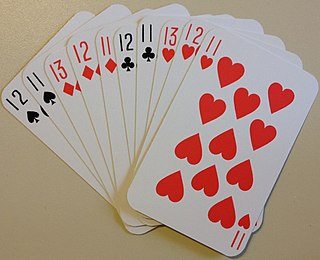
500 or Five Hundred is a trick-taking game developed in the United States from Euchre. Euchre was extended to a 10 card game with bidding and a Misere contract similar to Russian Preference, producing a good cut-throat three player game like Preference and a four player game played in partnerships like Whist which is the most popular modern form, although with special packs it can be played by up to six players. It arose in America before 1900 and was promoted by the US Playing Card Company, who copyrighted and marketed a deck with a set of rules in 1904. In 1906 the US Playing Card Company released the improved Avondale scoring table to remove bidding irregularities. 500 is a social card game and was highly popular in the United States until around 1920 when first auction bridge and then contract bridge drove it from favour. It continues to be popular in Ohio and Pennsylvania, where it has been taught through six generations community-wide, and in other countries: Australia, New Zealand, Canada and Shetland. Despite its American origin, 500 is the national card game of Australia.

Skat, historically Scat, is a three-player trick-taking card game of the Ace-Ten family, devised around 1810 in Altenburg in the Duchy of Saxe-Gotha-Altenburg. It is the national game of Germany and, along with Doppelkopf, it is the most popular card game in Germany and Silesia and one of the most popular in the rest of Poland. A variant of 19th-century Skat was once popular in the US. John McLeod considers it one of the best and most interesting card games for three players, and Kelbet described it as "the king of German card games."

Briscola is one of Italy's most popular games, together with Scopa and Tressette (Tresette). A little-changed descendant of Brusquembille, the ancestor of Briscan and Bezique, Briscola is a Mediterranean trick-taking, Ace-Ten card game for two to six players played with a standard Italian 40-card deck. The game can also be played with a modern Anglo-French deck, without the eight, nine and ten cards. With three or six players, twos are removed from the deck to ensure the number of cards in the deck is a multiple of the number of players; a single two for three players and all four twos for six players. The four- and six-player versions of the game are played as a partnership game of two teams, with players seated such that every player is adjacent to two opponents.
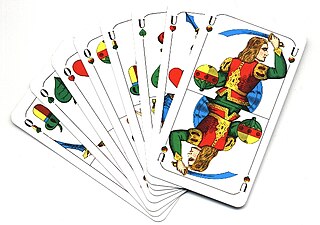
Schafkopf, also called Bavarian Schafkopf, is a popular German trick-taking card game of the Ace-Ten family for four players that evolved, towards the end of the 19th century, from German Schafkopf. It is still very popular in Bavaria, where it is their national card game played by around two million people, but it also played elsewhere in Germany and in Austria. It is an official cultural asset and important part of the Old Bavarian and Franconian way of life. Schafkopf is a mentally demanding pastime that is considered "the supreme discipline of Bavarian card games" and "the mother of all trump games."

Doppelkopf, sometimes abbreviated to Doko, is a trick-taking card game for four players.
Ramsch, formerly also called Mike in East Germany, is a card game based on the contract of the same name in the popular German card games, Skat and Schafkopf. However, thanks to its interesting mode of play it has since developed into an independent game in its own right which is only loosely based on Skat or Schafkopf. It should not be confused with the games of the Rams family – Ramsen and Ramscheln – that also go by the name Ramsch.

Officers' Skat (Offiziersskat), is a trick-taking card game for two players which is based on the rules of Skat. It may be played with a German or French pack of 32 cards which, from the outset of the game, are laid out in rows both face down and face up. As in Skat, tricks are taken and card points counted to determine the winner of a round; game points are then awarded to decide the winner of a game. It is also called Two-hand Skat, Sailors' Skat (Seemannsskat), Farmers' Skat (Bauernskat), Robbers' Skat (Räuberskat) or Coachmen's Skat (Kutscherskat)

German Schafkopf is an old German card game and the forerunner of the popular modern games of Skat, Doppelkopf and Bavarian Schafkopf. Today it is hardly ever played in its original form, but there are a number of regional derivations.

Wendish Schafkopf, Wendisch or Wendsch is a card game for four players that uses a Schafkopf pack of German-suited cards or a Skat pack of French playing cards.
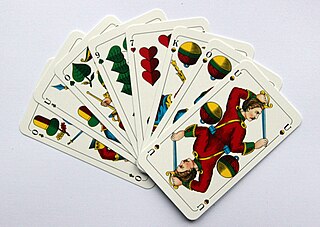
Mucken or Muck is a variation of the popular German card game, Schafkopf. However, unlike Schafkopf, it must always be played in teams of 2 players, so there are no soloist or Rufer ("caller") contracts. Mucken is mainly found in the province of Upper Franconia in the German state of Bavaria. Mucken is often played in Franconian restaurants, as it is part of the Franconian pub culture. The details of the rules vary greatly, even from village to village.
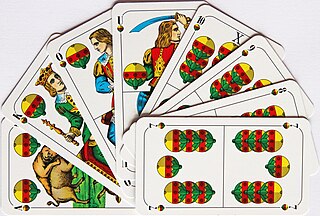
Bolachen is a traditional card game for 3 players that is played in Upper Bavaria. It is threatened by extinction.

Solo 66 is a trick-taking, Ace-Ten, card game for five players in which a soloist always plays against the other four. It is based on the rules of Germany's national game, Skat, and is played with a French-suited Skat pack of 32 cards. Bidding is for the trump suit. Jacks are ranked within their respective suits and do not form additional trumps over and above the cards of the trump suit. Grupp describes it as "an entertaining game for a larger group."

Bauerchen, also Bauerchens, Bauerspiel, Bauersche or Bauersches, is a trick-taking card game of the Ace-Ten family for four players that is played in the Palatinate region of Germany, especially around the city of Kaiserslautern, as well as in south Hesse. It is often played during leisure times as an alternative to well known games such as Schafkopf or Skat. Regular Bauerchen tournaments also take place. The game is named after its four permanent trumps or "Bowers".

Officers' Schafkopf, also called Open Schafkopf, Farmer's Schafkopf (Bauernschafkopf) or Two-Hand Schafkopf (Zweier Schafkopf or Schafkopf zu zweit, is a German point-trick, card game for two players which is based on the rules of Schafkopf. The game is a good way to learn the trumps and suits for normal Schafkopf and to understand what cards one is allowed to play.
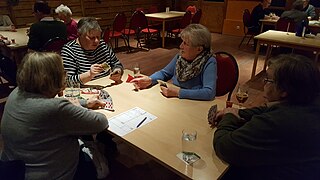
Fipsen or Fips is an old north German card game for 4 or 5 players that resembles British Nap in some respects. It is a trick-taking game played with a standard Skat pack that was once popular across North Germany in the former states of Schleswig, Holstein, Mecklenburg and Pomerania, but is now restricted to the south Holstein region. In the village of Thedinghausen in Lower Saxony, a rather different game is played under the same name for currant buns called Hedewigs. It has been described as "quite a special card game" that is "ancient, but very easy to learn".
Herzblatt or Herzblättchen is a German card game of the Ace-Ten family for two to five players. It bears a certain resemblance to the extinct 19th-century game of Piquesept, however without the special rules associated with the trump Seven.

Sjavs is a Danish card game of the Schafkopf family that is played in two main variants. In Denmark, it is a 3-player game, played with a shortened pack of 20 cards; in the Faroe Islands, where it is very popular, it is a four-hand, partnership game using a standard Piquet pack of 32 cards.

















